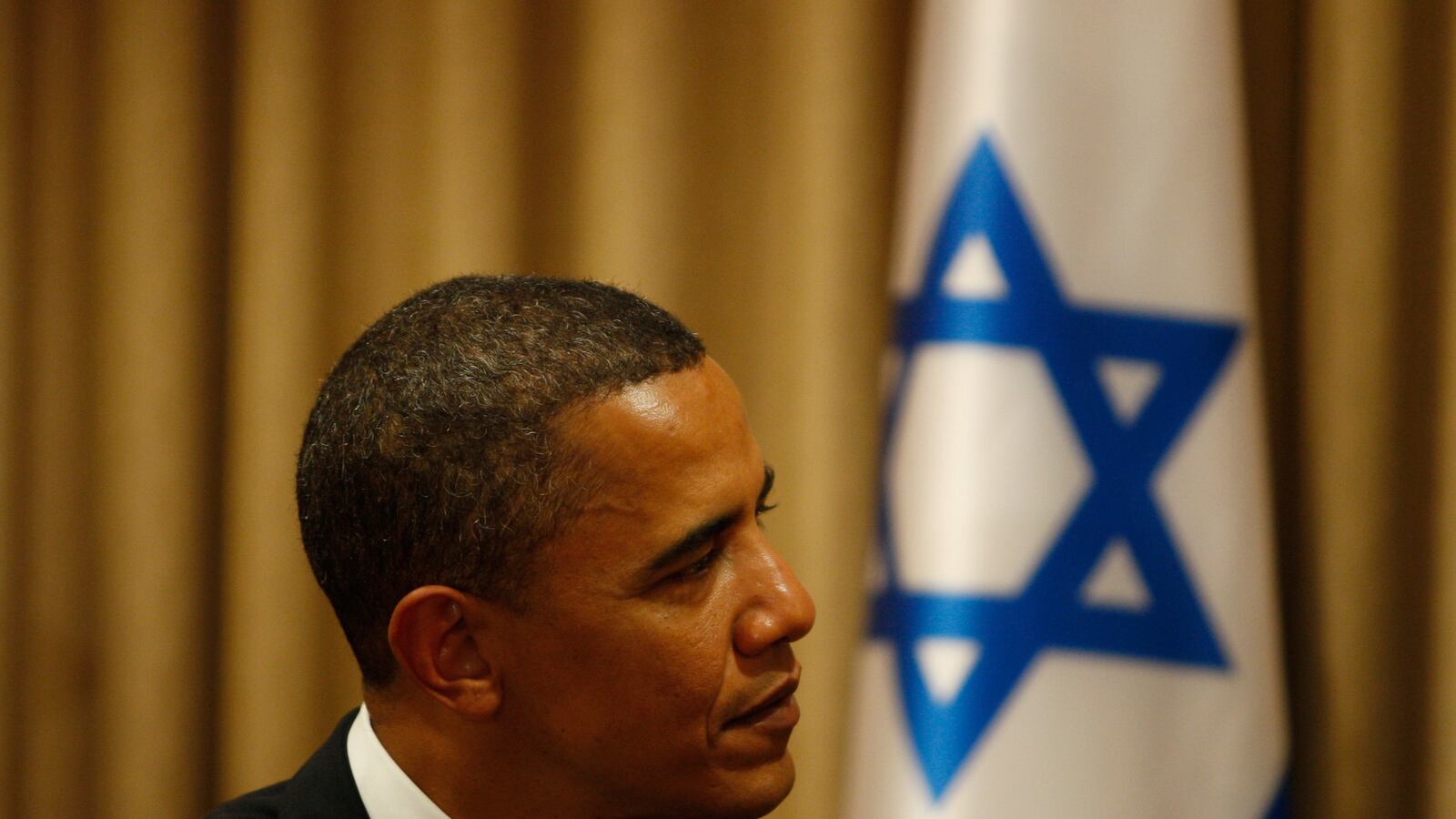So Obama is going to Israel. Like any number of my secular Jewish friends in their early twenties, our president has been persuaded that he needs to visit. On Monday, the Obama campaign announced, “We can expect him to visit Israel in a second term.”
Though conservatives have long attacked Obama for not travelling to Israel as president, that didn’t stop them from attacking him for his proposed trip. Over at Commentary, the contradiction was particularly sharp. This month’s Jonathan Tobin, saying Obama’s vow of a second-term Israel visit “merely worsened his difficulties with Jewish and pro-Israel voters” debated last month’s Jonathan Tobin, who chided Obama for not visiting Israel. I guess we should cheer any ideological diversity at Commentary. Still, the real moral of this partisan hackwork is that the “Why won’t Obama visit Israel?” complaint, and the broader genre of “But does Obama love Israel in his kishkes?” questions, just cannot be answered by anything Obama says or does. These aren’t political argument; they’re not even really about Obama. They’re internal American Jewish anxieties, projected into politics.

Because on the merits, Obama’s just as about as pro-Israel as they come. Not only did Obama fund the bulk of Israel’s Iron Dome defense system—which just yesterday intercepted another rocket from Gaza—and double the funding planned under Bush, he then sought (and got) more money in 2012 for Iron Dome. On Iran, he’s walked a steady, tough line since his 2008 campaign, when he put forward the idea (which Bush had passed on) of using sanctions to cut Iran’s gasoline imports. Those gas sanctions were incorporated in the tough sanctions bill he signed in 2010—a bill supported by daisy-chain beatniks like AIPAC, the American Jewish Committee, and Israeli Ambassador Michael Oren. At the United Nations, Obama’s veto is basically all that stands in the way of Abbas’s statehood bid. And the list goes on.
Bereft of serious arguments, anti-Obama types resort to tendentious claims about symbolic slights. Sure, he defended the idea of a Jewish state in Cairo—but he gave the wrong reason. He talks about the 1967 lines, plus or minus land swaps, as the basis of negotiations between Israel and the Palestinians—and I’ve been hearing “the ’67 lines, more or less” cited since I first started studying the conflict, in high school—and all of a sudden, he’s betraying Israel. Apparently, people even worry Obama cannot really love Israel, because he is not from New York.
So why are these “kishke” questions so compelling? Largely, I think, for the same reason millions get funneled into Birthright. American Jews aren’t sure about our own kishkes. Young American Jews don’t identify emotionally with Israel; they don’t share their parents sense of peoplehood, they intermarry, they’re alienated from the Zionist historical saga, they connect better with MLK and Civil Rights than with the Holocaust or the Six Day War.
These really are “kishke” questions. Ultimately, I doubt they have much to do Israeli politics. They’re about community, identity, and myth: Israel happens to be the way American Jews now agonize about assimilation. And this bleeds naturally into how we talk about Obama. Why? Well, Obama is the symbol—after the post-MLK racial scars of the burning Bronx, the drug war, and Rodney King—of a revitalized American myth of “post-racialism.” In the new melting pot, a “funny name” doesn’t keep you from your fancy law school or from assimilating into the elite. Obama doesn’t understand his father’s world, and he’s embarrassed at his grandmother’s antiquated ideas on race—plenty of Jews my age recognize that. The genius of Sarah Silverman’s “Great Shlep” shtick in 2008 was that its narrative of Jewish generational gap dovetailed nicely with Obama’s own story. Because, as others have pointed out, Obama feels so Jewish, he is a natural object onto whom to project our fears that particularistic Jewish identity—tribal affiliation, if you like—is passé. (Romney, in his fidelity to a tight-knit and insular Mormon counter-culture, is the anti-Obama, which might explain why he does well with older Jews.)
The only trouble is, all this makes absolutely terrible politics. American Jews should demand the specific policies they want from Obama. If we ask for changes from decades of American policy (as right-wingers do when they chastise Obama for being anti-settlement), we’ll be disappointed. If we ask for unparalleled military aid, diplomatic support in the international community, and strong action on Iran, we’ll get what we want. But when we ask questions like “who visited Israel when?” we leave politics and enter the murkier realms of feelings, inner secrets, and identity.
We need to learn to separate Jewish politics from Jewish angst about identity, community, and solidarity. This is about rockets, settlements, sanctions and UN votes, not about kishkes, bagels, or whether Obama and Netanyahu are warm friends. Obama’s visiting Israel won’t mysteriously make him a New York Jew. This is, after all, politics—not Birthright.






